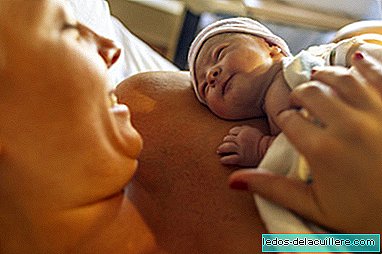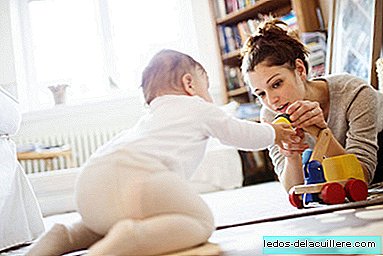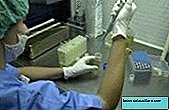
Not allowing the baby to remain with his mother from the moment he is born is a custom still widespread and very harmful to the baby. The Swedish doctor Nils Bergman, a specialist in perinatal neuroscience and one of the great disseminators of the kangaroo method and the benefits of skin to skin, argues that "We can show that avoiding separation is better, but society cannot believe that this means that separation is harmful."
According to the expert, The main problem caused by the absence of skin with skin since the baby is born is a greater difficulty in establishing optimal breastfeeding, which requires a deep emotional connection between the baby and the mother.
Skin to skin: all are benefits
Many health professionals who attend childbirth are not yet aware of the importance of not separating mother and baby during the first hours after birth. This is explained by Dr. Bergman, although he acknowledges that it is evolving:
“The problem is that there is a delay between knowledge and practice because health systems are too slow to implement new discoveries. That is why I would say that the biggest problem at this moment is not knowledge, but the systems that prevent professionals from doing good practices. ”
According to Dr. Nils Bergman, in the physiological transition of the baby to extrauterine life they are carried out "Several critical processes". The mother's contact with the baby, says the expert, actively regulates these processes in the same way that separation interrupts them.
"At the same time emotional brain connections are made from the first thousand seconds of life. Again, separation prevents such connections. The sooner we allow them to be made, the stronger and safer the connections will be. ”
Skin with skin in large premature babies

At present, Bergman is developing a multi-center study in five countries that aims to demonstrate that the kangaroo method also saves lives in premature babies up to 26 weeks, which would mean a revolution in baby care.
According to the expert, many of the sequelae associated with prematurity could really be sequelae of the incubator:
“There are already two randomized controlled trials on this topic that included large premature babies, between 1,200 and 2,200 grams one (2004), and between 1,500 and 2,500 grams another (2015), which have shown that the smaller the babies are , more unstable are in the incubator. "
This is how the Swiss doctor explains that in the biology of full-term babies, the mother is the "regulator" of the transition to extrauterine life and subsequent health.
 In Babies and more One of every seven babies in the world is born with low weight, which causes serious consequences for their health
In Babies and more One of every seven babies in the world is born with low weight, which causes serious consequences for their healthThis ensures that, "the separation of babies is potentially harmful, because self-regulation triggers cortisol levels, which are stressful and can decrease the ability of babies to recover. ”
In his opinion, the establishment of breastfeeding "It matters deeply for short-term health and for long-term physical health, for emotional and social intelligence, and even for a higher IQ and for entering adulthood."
In parallel to these benefits for the newborn, Bergman argues that there are also a series of processes of Neural plasticity in the mother, which gives it greater emotional resistance and even better health in old age.
"More than anything, a good breastfeeding makes it easier to be a mother more natural, easy and enjoyable."The baby's first hours and emotional connection
Mothers and babies should keep in close physical contact from birth and thus begin to establish an emotional connection.
According to Bergman, you have to start by placing the baby on the mother's belly, covering it and drying it with a hot towel and without cutting the umbilical cord until later.
 In Babies and moreEye contact with your baby: why it is important to look the newborn in the eyes
In Babies and moreEye contact with your baby: why it is important to look the newborn in the eyesWhen the newborn is dry, it must be placed on the mother's chest, keeping it covered with another preheated towel.
"From there you should not disturb them and encourage the mother to observe the baby, talking or singing if you want."
During the next hour the baby will be hooked to the chest. If this is not the case, because of the medication or because it is very small, the mother, the specialist explains, should take the colostrum and give it to the baby:
“This must be done before 60 minutes. There is a good supply of colostrum before, but nothing after that time. After the first hour the baby should sleep with the mother so that, when she wakes up, breastfeed again. "
Dr. Bergman concludes that the mother and the baby should never be alone, so when the mother needs to go to the bathroom, it must be the father who makes the skin-to-skin contact with the baby until the mother can continue it.
Photos | iStock












